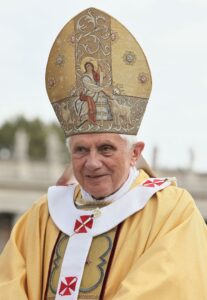Pope Emeritus Benedict XVI has died. He was ninety-five years old.
Benedict XVI was born Joseph Ratzinger in 1927 in Marktl, Bavaria, Germany, and lived his early life in the nearby town of Traunstein. Ratzinger and his family maintained their Catholic faith even during Nazi rule of Germany from 1933 to 1945, when the church was subject to official hostility.
Ratzinger entered seminary at the age of twelve and attended until it was closed three years later by the German military. He was conscripted by law into the Hitler Youth when he turned fourteen in 1941, but refused to attend the required meetings. At age sixteen he was conscripted into the German anti-aircraft corps and later underwent infantry training, but deserted his military post in 1945 and returned home shortly before Germany fell to Allied invasion. Because he had served in the German military, he was briefly held by the Allies as a prisoner of war.
Ratzinger and his brother Georg were both ordained to the Catholic priesthood in 1951. As priest, he served as a parish chaplain and later as a university lecturer and theologian. He was a participant in the Second Vatican Council, a theological consultant to Cardinal Frings of Cologne, and eventually Vice President of the University of Regensburg. Ratzinger was ordained a bishop in 1977 and was appointed Archbishop of Munich and Freising, adopting “cooperators of the truth” as his episcopal motto. Later that same year he was named a cardinal, and Ratzinger participated in the two 1978 conclaves that elected Pope John Paul I and Pope John Paul II respectively.
Pope John Paul II appointed Ratzinger as Prefect of the Congregation for the Doctrine of the Faith in 1982, a role he held until was elected pope in 2005. The Congregation was founded in 1542 to “spread sound Catholic doctrine and defend those points of Christian tradition which seem in danger because of new and unacceptable doctrines.” In this role, he presided over the commission that prepared the current version of the Catechism of the Catholic Church.
In the conclave following the death of Pope John Paul II in 2005, Ratzinger was elected the 265th pope. He took the regnal name Benedict XVI in honor of Pope Benedict XV, who served from 1914 to 1922, and Saint Benedict of Nursia, a sixth century figure who is recognized as a patron saint of Europe. At the age of seventy-eight, Benedict XVI was the oldest person to rise to the papacy since 1730.
The office of pope was established by Jesus of Nazareth (c.f., Matthew 16) and was first held by Saint Peter, who served from about A.D. 30 to A.D. 68. The scriptures and traditions of the church have always acknowledged Peter and his successor Bishops of Rome as first among the bishops and head of the church on earth while it awaits the return of Christ, although the exact nature of that headship has evolved over time. During the papacy of Benedict XVI, the full formal title of the office was: His Holiness Benedict XVI, Bishop of Rome, Vicar of Jesus Christ, Successor of the Prince of the Apostles, Supreme Pontiff of the Universal Church, Primate of Italy, Archbishop and Metropolitan of the Roman Province, Sovereign of the Vatican City State, Servant of the servants of God.
During Benedict XVI’s eight year papacy, he emphasized a “hermeneutic of continuity” between church practices in the modern era (i.e., after the Second Vatican Council) and what had come before. He attempted to clarify and bolster the church’s unchanging teachings, and to show that tradition, properly understood, could be a source of renewal and strength.
In 2013, Benedict XVI made the stunning announcement that he would become the first pope in nearly six hundred years to resign. The last pope to resign before Benedict XVI was Gregory XII in 1415, who was pressured to step down in order to resolve the western schism. The last pope to resign without external pressure was Celestine V in 1294. Upon his resignation, he was styled as Pope Emeritus Benedict XVI. He lived within the Vatican in the Mater Ecclesiae Monastery until his death.
Benedict XVI will lie in state in Saint Peter’s Basilica at the Vatican beginning on January 2. His funeral will be held on January 5 and will be celebrated by Pope Francis.


